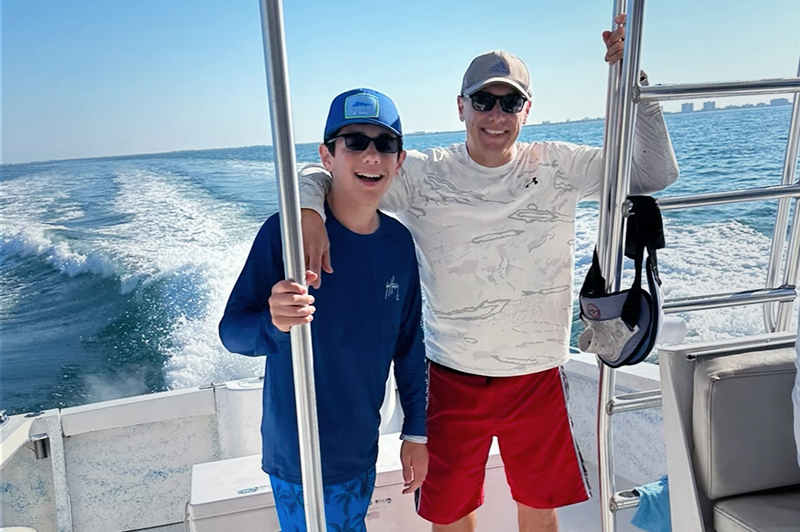What is peroral endoscopic myotomy (POEM)?
Peroral endoscopic myotomy (POEM) is a type of endoscopic procedure used to treat esophageal achalasia — a disorder of the esophagus that makes swallowing difficult. Developed in 2008, it is the first widely adopted natural orifice endoscopic surgery. That means that it allows clinicians to access areas in the abdomen or chest through a naturally occurring orifice (opening), in this case, the mouth.
Esophageal achalasia is typically treated with a procedure called a laparoscopic or thoracoscopic myotomy, a surgical procedure that cuts the lower esophageal sphincter, allowing food and liquids to pass to the stomach. POEM is a less-invasive way to perform the same surgical repair with similar outcomes, shorter hospital stays and recovery times, and without skin incisions or surgical access points through the abdomen or chest wall. For some types of esophageal achalasia, POEM has improved clinical results because it allows for treatment of a longer length of esophageal muscle above the sphincter.
Who is eligible for peroral endoscopic myotomy (POEM)?
POEM can be performed on children of all ages who have esophageal achalasia. Your child’s clinician can help determine whether POEM is right for them.
What happens during peroral endoscopic myotomy (POEM)?
Your child will need to fast (no eating or drinking) for approximately 12 hours prior to the POEM procedure. Solid food is typically held after noon on the day prior to the procedure but liquids are continued up to midnight the day prior to the procedure. POEM is performed while your child is under anesthesia.
The doctor will pass an endoscope — a thin, flexible tube — through your child’s mouth and into their esophagus. The endoscope has a tiny camera that allows the doctor to see images from the esophagus on a video monitor.
Once inside the esophagus, the doctor will make a small incision in its lining. The endoscope is then advanced through the incision and a tunnel is created in the wall of the esophagus to the lower esophageal sphincter (the band of muscle that does not relax and open in patients with achalasia). This lower sphincter is then cut, which is called a myotomy.
At Boston Children’s Hospital, we perform an additional measurement of the pressures of the lower esophageal sphincter (called an Endoflip) before and after the sphincter is cut to ensure that the esophageal sphincter has been appropriately opened to improve swallowing.
After the sphincter is cut, the doctor will close the small incision at the opening of the tunnel with small clips, which come off on their own over the next couple weeks and pass through the GI tract.
Following POEM, your child will need to stay in the hospital overnight to recover. Most children have only minimal discomfort from the procedure. Their doctor will prescribe antibiotics to help prevent infection. The day after the POEM, your child will undergo a barium swallow x-ray test to confirm that the procedure was successful prior to returning home. Your child should advance their diet back to regular table foods at home over the course of several days. Most children are able to return to regular activities (such as school) within three days of their POEM procedure.

Meet Peyton
When Peyton started experiencing pain when he ate, his parents knew he needed specialized care. Find out how a less-invasive procedure available at just a few hospitals, including Boston Children’s, has helped him enjoy a pain-free life back home in Florida.
Peroral endoscopic myotomy (POEM) at Boston Children’s Hospital
Although POEM is increasingly used to treat esophageal achalasia in adults, Boston Children’s Hospital is one of just a few pediatric hospitals to offer POEM to teens and older children, and our pediatric gastroenterologist, Peter Ngo, MD, is the first specialist of his kind to successfully perform this procedure in the United States. He works closely with clinicians from the Motility and Functional Gastrointestinal Disorders Center and the Esophageal and Airway Treatment Center to provide exceptional care to patients eligible for POEM.
Peroral Endoscopic Myotomy (POEM) | Programs & Services
Programs
Motility and Functional Gastrointestinal Disorders Center
Program
The Motility and Functional Gastrointestinal Disorders Center offers a unique combination of services covering all facets of motility and functional disorders.
Learn more about Motility and Functional Gastrointestinal Disorders Center

